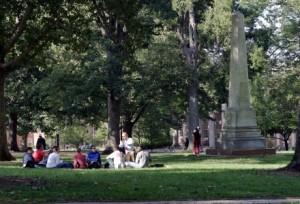>> In this difficult job market, many people are turning to the state’s universities and community colleges in hopes of improving their odds of finding a much-needed job. Young adults are doing their best to prepare for a world where some kind of certificate or degree is essential to landing a living-wage job. Others are returning to school to beef up their resumes.
In this difficult job market, many people are turning to the state’s universities and community colleges in hopes of improving their odds of finding a much-needed job. Young adults are doing their best to prepare for a world where some kind of certificate or degree is essential to landing a living-wage job. Others are returning to school to beef up their resumes.
All of this benefits North Carolina, as most businesses—excluding McDonald’s or Wal-Mart– prefer to recruit employers from a well-educated labor pool.
But for students who are already struggling financially, things are about to get harder: the state budget cuts funding for the UNC system by $66 million. >>As reported in NCSU’s Technician, these cuts “will be added [on top of the] long-term $400 million budget reduction handed down two years ago – something opponents say will have drastic consequences for education.”
The UNC Board of Governors will decide how to spread out the cuts across the state’s universities, but school leaders are already worried. >>As NC State Chancellor Randy Woodson told NC Policy Watch, universities had to increase class sizes and reduce class offerings because of past budget cuts, and figuring out where to cut now is going to be an exceptional challenge. “Faculty, their workload is already very high. They are doing a lot of administrative work they used to not have to do because we have lost so many administrative positions,” Woodson explained. He also worries about keeping talented professors and researchers on staff because, once again, the slashed budget prevents salary increase.
The community colleges also face money troubles. The state budget included a tuition increase of $2.50 per credit hour. As Dr. Kerry Youngblood, president of Carteret Community College, >>explained to the Carteret County News-Times, “Any time the state implements a tuition increase, we know it will negatively impact our students. Looking at it overall, the budget reductions will make it more difficult for community colleges to meet the needs of their students and communities.”
>>The High Point Enterprise reports that Randolph Community College may cut programs, while Davidson County Community College plans to reduce course offerings, class sizes, and staffing in order to deal with the budget cuts.
You know times are tough when prominent conservatives start speaking out against the education budget. >>Dr. Assad Meymandi serves on the board of the John Locke Foundation, the state’s leading cut-taxes-no-matter-the-consequences think tank. Despite his solidly conservative credentials, Meymandi sent a letter to the Raleigh News & Observer after the state budget passed. Here’s an excerpt:
“It is truly frightening to see what the legislature is doing to the budgets of the UNC system, NC community college system, and UNC-TV. With the deep cuts in funding education, the next 60 years look bleak and onerous. As one citizen, I am asking not to cut taxes. I am willing to pay more than my fair share to spend on education.”
The beauty of this letter is that it illustrates the difference between conservatives and those who solely focus on cutting taxes. You can believe in fiscal responsibility and still recognize the importance of public investments that benefit your community and state. You can believe in small government and still support the common good.
When you look at it that way, it seems like progressives and conservatives aren’t really all that far apart when it comes to things that matter, like education. It’s just the state legislature that’s completely out in left field.
There are no comments
Add yours